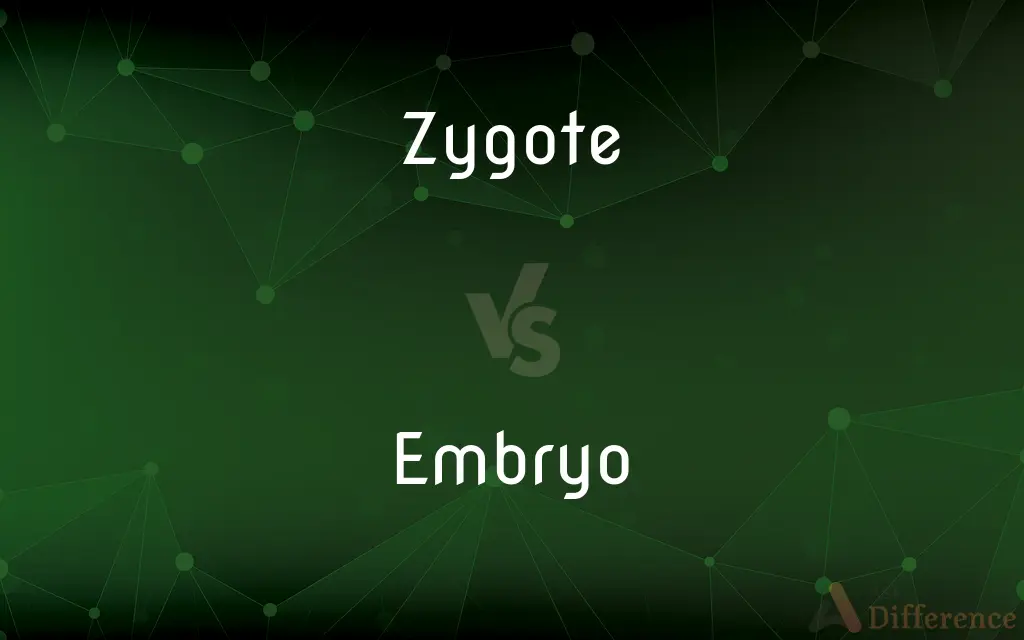Zygote vs. Embryo — What's the Difference?
Edited by Tayyaba Rehman — By Maham Liaqat — Updated on March 13, 2024
A zygote is the initial cell formed when two gamete cells merge, whereas an embryo is the next developmental stage after the zygote begins cell division.

Difference Between Zygote and Embryo
Table of Contents
ADVERTISEMENT
Key Differences
A zygote is formed immediately after the fertilization of an egg by a sperm, representing the earliest stage of human development. It is a single cell that contains all the genetic information necessary to form a complete human being. An embryo, on the other hand, is the stage following the zygote, after the cell has started to divide, continuing until about the eighth week of pregnancy in humans, when it becomes known as a fetus.
The zygote undergoes a process called cleavage, where it divides without growing, leading to a multicellular stage. This is still considered part of the zygotic phase until the formation of the blastocyst, which then implants in the uterine wall, marking the beginning of the embryonic stage. Embryos undergo rapid divisions and differentiation, where cells start to take on specific functions, a process not seen in the zygote stage.
The zygote forms in the fallopian tube and begins its journey to the uterus. The embryo, however, develops within the uterus after implantation. This difference in location corresponds to their stages of development, with the zygote being the mobile precursor to the more stationary embryo.
Both the zygote and embryo contain the complete DNA necessary for a full human life. However, the zygote is a unique, single cell with this genetic material, while the embryo consists of multiple, increasingly specialized cells. The transition from a zygote to an embryo is marked by significant biological processes, including cell division, migration, and differentiation.
The zygote represents a critical juncture in human development, being the point at which genetic material from both parents is first combined. The embryo stage is where the foundation for all organ systems and structures is laid, highlighting a period of significant complexity and growth that builds upon the initial blueprint provided by the zygote.
ADVERTISEMENT
Comparison Chart
Definition
The initial single cell formed from the union of sperm and egg.
The developmental stage following the zygote, characterized by rapid cell division and differentiation.
Development Stage
Earliest stage of human development.
Follows the zygote stage, up to the eighth week in humans.
Cell Number
Single cell.
Multiple cells, increasing through division.
Genetic Material
Contains complete DNA from both parents.
Same DNA, but cells begin to specialize.
Location
Forms in the fallopian tube, then moves to the uterus.
Develops in the uterus after implantation.
Compare with Definitions
Zygote
The product of gender reproduction.
The fusion of two gametes creates a zygote, initiating the developmental process.
Embryo
The stage where major body systems begin to form.
By the end of the embryonic period, the heart starts beating.
Zygote
The initial cell formed by the combination of sperm and egg.
The zygote contains all the genetic information needed for a new individual.
Embryo
A developing organism after the zygote stage.
The embryo undergoes significant growth and differentiation early in pregnancy.
Zygote
Contains a full set of chromosomes.
The zygote's chromosomes include a mix from both parents, determining genetic traits.
Embryo
Develops within the uterus.
The embryo implants in the uterine wall, a critical step for sustained development.
Zygote
Represents the beginning of human development.
From the moment of fertilization, the zygote begins its journey towards becoming a complex organism.
Embryo
Characterized by cell division and specialization.
Embryo development includes the formation of basic structures that will become organs.
Zygote
A unique, single-cell stage.
The zygote stage is crucial as it marks the first instance of a genetically distinct human being.
Embryo
A critical period for genetic and environmental influences.
The embryo's development can be significantly affected by the health and environment of the mother.
Zygote
A zygote (from Greek ζυγωτός zygōtos "joined" or "yoked", from ζυγοῦν zygoun "to join" or "to yoke") is a eukaryotic cell formed by a fertilization event between two gametes. The zygote's genome is a combination of the DNA in each gamete, and contains all of the genetic information necessary to form a new individual.
Embryo
The collection of cells that has developed from the fertilized egg of a vertebrate animal, before all the major organs have developed.
Zygote
The cell formed by the union of two gametes, especially a fertilized ovum before cleavage.
Embryo
A collection of such cells of a human, especially from implantation in the uterine wall through the eighth week of development.
Zygote
The organism that develops from a zygote.
Embryo
(Botany) The young sporophytic plant contained within a seed or an archegonium.
Zygote
A fertilized egg cell.
Embryo
An organism at any time before full development, birth, or hatching.
Zygote
The cell resulting from the union of an ovum and a spermatozoon (including the organism that develops from that cell)
Embryo
A rudimentary or beginning stage
An idea that was the embryo of a short story.
Embryo
In the reproductive cycle, the stage after the fertilization of the egg that precedes the development into a fetus.
Embryo
An organism in the earlier stages of development before it emerges from the egg, or before metamorphosis.
Embryo
In viviparous animals, the young animal's earliest stages in the mother's body
Embryo
In humans, usually the cell growth of the child within the mother's body, through the end of the seventh week of pregnancy
Embryo
(botany) A rudimentary plant contained in the seed.
Embryo
(figurative) The beginning; the first stage of anything.
Embryo
The first rudiments of an organism, whether animal or plant
Embryo
Pertaining to an embryo; rudimentary; undeveloped; as, an embryo bud.
Embryo
(botany) a minute rudimentary plant contained within a seed or an archegonium
Embryo
An animal organism in the early stages of growth and differentiation that in higher forms merge into fetal stages but in lower forms terminate in commencement of larval life
Common Curiosities
How does a zygote become an embryo?
A zygote becomes an embryo through a process called cleavage, where it divides multiple times without growing, eventually leading to the formation of a multicellular organism that implants in the uterus.
Why is the embryonic stage important?
The embryonic stage is crucial for the formation of essential body systems and structures, laying the foundation for all subsequent development.
What is an embryo?
An embryo refers to the developmental stage after the zygote, marked by cell division and differentiation, lasting until the eighth week of human development.
Are the zygote and embryo genetically different?
No, both the zygote and embryo contain the same genetic material; however, the embryo begins to show cell differentiation, where cells start to specialize.
Can we see the zygote with the naked eye?
No, the zygote, being a single cell, is too small to be seen without the aid of a microscope.
What is the significance of the embryonic stage in medical research?
The embryonic stage is of great interest in medical research for understanding human development, genetic diseases, and the effects of environmental factors on early development.
What is a zygote?
A zygote is the single cell formed immediately after the sperm fertilizes the egg, containing all genetic information for the individual.
What happens after the embryonic stage?
After the embryonic stage, the organism is referred to as a fetus, which continues to develop and grow until birth.
What factors can affect embryonic development?
Genetic factors, nutrition, environmental exposures, and maternal health can all significantly impact embryonic development.
How long does the zygote stage last?
The zygote stage lasts until the fertilized egg has divided several times to form a multicellular organism, usually a few days after fertilization.
How are abnormalities detected in the embryonic stage?
Abnormalities can be detected through various prenatal tests, including ultrasound and genetic testing, to assess the health and development of the embryo.
How is the embryo nourished?
The embryo is nourished through the placenta, which allows for the exchange of nutrients and waste products between the mother and the developing embryo.
Is the zygote capable of independent growth?
The zygote itself is not capable of growth without dividing; its development into an embryo through cell division is necessary for further growth and specialization.
What distinguishes the zygote from other stages of development?
The zygote is distinguished by being the very first, single-cell stage following fertilization, containing a complete set of genetic information.
Can environmental factors affect the zygote?
While the zygote is somewhat protected, environmental factors can affect its viability and ability to implant and develop into a healthy embryo.
Share Your Discovery

Previous Comparison
Tenderloin vs. Loin
Next Comparison
While vs. WhenAuthor Spotlight
Written by
Maham LiaqatEdited by
Tayyaba RehmanTayyaba Rehman is a distinguished writer, currently serving as a primary contributor to askdifference.com. As a researcher in semantics and etymology, Tayyaba's passion for the complexity of languages and their distinctions has found a perfect home on the platform. Tayyaba delves into the intricacies of language, distinguishing between commonly confused words and phrases, thereby providing clarity for readers worldwide.














































